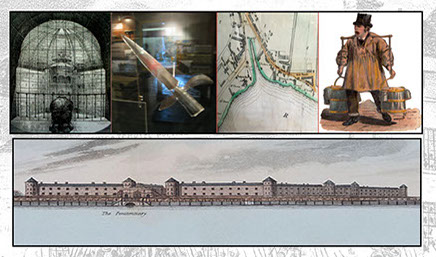
In Search of Jenkin Morgan

After our Annual Chartist Convention was cancelled during the Covid Pandemic, Our Chartist Heritage embarked on a digital journey to keep the Chartist story alive. An online video of a talk by Peter Strong was the result. This was followed by a live Zoom Q&A in December 2020. The second video talk by Ray Stroud "Searching for Jenkin Morgan" is live and a Q&A will take place on 22 April https://www.newportrising.co.uk/lineup
Jenkin Morgan has become part of the invisible landscape of Welsh Chartism. This Pill milkman, tallow chandler and soap boiler was initially sentenced to be hung, drawn and quartered alongside John Frost, Zephaniah Williams and William Jones at Monmouth in 1840, and yet very few people today even know his name.
As the three ‘Welsh Martyrs’ were shipped off to Tasmania on board the Mandarin, Morgan’s sentence was commuted to five years imprisonment in the Millbank Penitentiary. He emerged from his incarceration in 1844 a broken and impoverished man.
His role in the Newport Rising of 1839 is a fascinating one. His power base was located in the closed, working-class community of Pillgwenlly with its beer shops, Chartist lodges and pike-making factories. As a captain of a ‘Section of Ten’ he was tasked with signalling the arrival of the ‘men of the hills’ into Newport on the morning of 4 November. He was also meant to blow up the bridge over the River Usk using large amounts of requisitioned gunpowder.
Of course, the Rising failed and the bridge stayed intact. In its immediate aftermath, Jenkin Morgan fled into Glamorgan before attempting to seek sanctuary in London. The manhunt that ensued witnessed his capture in the Bunch of Grapes public house in Bristol, just hours before his coach was to head out of the city on the Great West Road for London.
This is a story of betrayal, retribution and suffering. Pardoned by Queen Victoria on 10 May 1844, he was soon to be described by Feargus O’Connor as a ‘Chartist scarecrow’. Everything he had once owned had been taken from him - and yet he remained a radical, committed to the cause of liberty.
The last record of his life is found in the Northern Star on 29 January 1848. It advertised a dinner he was organising in Merthyr in memory of the English radical Thomas Paine, suggesting that he remained a Chartist to the end.
Watch the video talk now @ https://www.youtube.com/watch?v=u6Sy73D07cI
Take part in the online Q&A on 22 April with Ray and Melinda Drowley https://www.newportrising.co.uk/lineup
https://www.newportrising.co.uk/lineup









